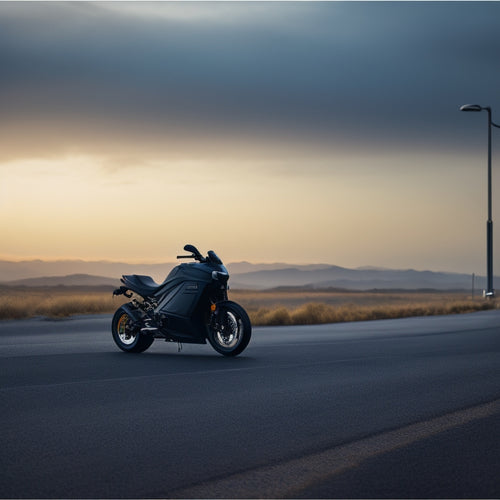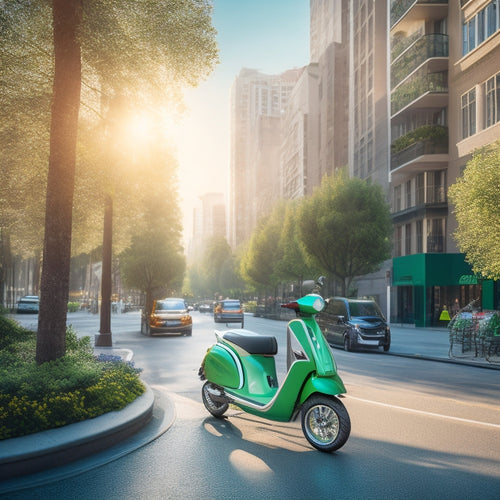
Best Solar Panels for Roof Installation
Share
When selecting the best solar panels for your roof installation, you'll want to focus on high-efficiency models from top brands like Panasonic and SunPower, which offer exceptional quality, durability, and performance. Consider key features like efficiency ratings, power output, and temperature coefficient to guarantee maximum energy harvesting. Durable panels with anodized aluminum frames and tempered glass or coatings will withstand extreme conditions. Look for extensive warranties and certifications like IEC to assure reliability. By choosing the right panels, you'll maximize your return on investment and minimize maintenance costs - and that's just the starting point for optimizing your solar setup.
Key Takeaways
- High-efficiency solar panels from top brands like Panasonic and SunPower maximize energy harvesting potential and provide better ROI.
- Durable panels with anodized aluminum frames, tempered glass, and IP67+ ratings ensure longevity and low maintenance costs.
- Comprehensive warranties of 25+ years from manufacturers provide protection against repairs and promote sustainability.
- Proper installation by experienced professionals is crucial for efficient and safe operation, with consideration for roof integrity and electrical connections.
- Budget-friendly options, including financing plans, tax credits, and rebates, make solar energy more accessible for homeowners.
Top Solar Panel Brands
Among the numerous solar panel brands available in the market, five stand out for their exceptional quality, efficiency, and durability. You're likely familiar with their names, but what sets them apart is their commitment to staying at the forefront of solar technology trends.
These brands have built a reputation for providing high-performance solar panels that can withstand the test of time.
As you investigate the market, you'll notice that these top brands have established themselves as leaders in the industry. They've achieved this by investing heavily in research and development, ensuring their products stay ahead of the curve.
Their panels boast impressive efficiency rates, durable designs, and innovative features that maximize energy output.
When considering solar panels for your roof installation, it's crucial to prioritize brand reputation. Look for brands that have a proven track record of providing high-quality products and exceptional customer service.
Key Features to Consider
When selecting the best solar panels for your roof installation, you'll want to evaluate the key features that impact their overall performance and longevity.
Efficiency and performance are vital, as they directly affect how much energy your system can generate.
You should also assess panel durability, as a longer-lasting system will provide a better return on your investment.
Efficiency and Performance
Determine your solar panel's energy yield by examining its efficiency and performance. These two factors are essential in maximizing your solar panel's potential and reducing your environmental impact. With recent solar technology advancements, you can expect higher efficiency rates, resulting in more electricity generated per unit area.
When evaluating efficiency and performance, consider the following key metrics:
| Metric | Description |
|---|---|
| Efficiency (%) | The percentage of sunlight converted into electrical energy |
| Power Output (W) | The maximum power the panel can produce under standard test conditions |
| Temperature Coefficient (%/°C) | The rate at which the panel's efficiency decreases as temperature increases |
| Fill Factor (%) | The ratio of the panel's actual power output to its theoretical maximum output |
| Maximum Power Point Tracking (MPPT) | The technology that optimizes energy production by tracking the maximum power point |
Panel Durability Matters
As you weigh your solar panel options, remember that durability is essential to guaranteeing a strong return on investment and minimizing maintenance costs over the system's lifespan. A durable solar panel can withstand various environmental conditions, reducing the likelihood of repairs and replacements.
When evaluating panel durability, consider the weather resistance of the panel's materials, such as the frame, glass, and sealants. A weather-resistant panel can better withstand extreme temperatures, humidity, and weather events like hail and hurricanes.
Look for panels with a proven track record of performance in harsh environments. Check the manufacturer's warranty and expected panel lifespan, which should be at least 25 years. A longer warranty period and expected lifespan indicate a more durable panel.
Additionally, consider the panel's certification, such as the International Electrotechnical Commission (IEC) certification, which guarantees the panel meets rigorous testing standards for durability and performance.
Efficiency and Performance
When selecting solar panels for your roof installation, you'll want to evaluate those with a high energy conversion rate, as they can generate more power per hour of sunlight.
A higher maximum power output also means you'll need fewer panels to meet your energy needs.
High Energy Conversion Rate
With your roof installation, you're looking to maximize energy harvesting, and that's where high-efficiency solar panels come into play. High energy conversion rates are essential to optimize your energy yield. Solar technology advancements have led to significant improvements in panel efficiency, allowing you to generate more power from the same surface area.
| Solar Panel Model | Efficiency Rating |
|---|---|
| Panasonic HIT-240 | 21.8% |
| SunPower X-Series | 22.8% |
| LG NeON 2 | 20.5% |
| Trina Tallmax M10 | 20.3% |
| Hanwha Q CELLS Q.PEAK | 20.2% |
When selecting solar panels, look for high-efficiency ratings to guarantee you're getting the most out of your roof space. A higher efficiency rating means more energy is converted from sunlight, resulting in increased energy yield optimization. By choosing high-efficiency solar panels, you can expect a higher return on investment and a reduced carbon footprint.
Maximum Power Output
Twenty-five years of solar panel development have led to important advancements in maximum power output. You now have access to highly efficient solar panels that can generate more power per hour of sunlight. This increased power output is a direct result of solar technology advancements, which have improved the conversion rate of sunlight into usable electricity.
When selecting solar panels for your roof installation, it's vital to take into account the maximum power output. You want to guarantee you're getting the most energy possible from your solar panel system. The power output is measured in watts (W), and the higher the wattage, the more electricity your system will produce.
Rooftop orientation also plays a key role in maximizing power output. Panels installed on a south-facing roof with a tilt angle between 30° and 40° will generally produce more power than those on an east- or west-facing roof.
Durability and Warranty
Upon examining the specifications of top-tier solar panels, you'll find that durability and warranty are essential factors in guaranteeing a long-lasting and trouble-free roof installation.
These factors directly impact the environmental impact of your solar panel system, as a longer-lasting system reduces the need for frequent replacements, thereby minimizing waste and promoting material sustainability.
When evaluating durability, look for solar panels with:
- Anodized aluminum frames that can withstand harsh weather conditions
- Tempered glass or resistant coatings that protect the panel from extreme temperatures and physical stress
- IP67 or higher ingress protection ratings to guarantee resistance to water and dust
A thorough warranty that covers the panel's performance, parts, and labor for an extended period (typically 25 years or more) provides peace of mind and protection against unforeseen repairs or replacements.
Budget-Friendly Solar Options
Investing in solar panels doesn't have to break the bank. You can find budget-friendly solar options that fit your financial plan.
One way to reduce upfront costs is to investigate affordable financing options. Many solar panel manufacturers and installers offer financing plans with low or no down payments, making it easier to get started with solar energy.
Additionally, you can take advantage of government incentives, such as the Solar Investment Tax Credit (ITC), which allows you to claim a tax credit of up to 26% of the total cost of your solar panel system.
State and local governments also offer rebates and incentives that can help offset the cost of solar panels.
Installation and Maintenance
Properly installing your solar panel system is crucial to guarantee it operates efficiently and safely.
You'll want to verify that your solar panels are installed at the ideal angle and direction to maximize energy production. This typically means facing them south and tilting them between 30 and 40 degrees.
When it comes to installation techniques, you'll want to take into account the following:
-
Solar panel placement: Avoid installing solar panels in shaded areas, as this can considerably reduce energy production. Make sure to install them in a location that receives direct sunlight for most of the day.
-
Roof penetration: Ascertain that the installation method you choose doesn't compromise your roof's integrity. Look for installers that use flashing or other methods to seal any holes or gaps.
-
Electrical connections: Verify that all electrical connections are secure and meet local electrical codes. This will prevent electrical shock and ascertain the system operates safely.
Frequently Asked Questions
Can I Install Solar Panels on a Metal Roof?
You can install solar panels on a metal roof, leveraging its advantages like durability and weather-tightness. However, you'll need to evaluate installation specifics, such as clamping systems and waterproofing, to guarantee a secure and efficient setup.
Do Solar Panels Work During Power Outages?
When the grid goes dark, you're left in the dark, but solar power can be your knight in shining armor. You won't be left high and dry during power outages with a solar panel system, achieving energy independence and keeping your lights on.
How Do I Clean Snow off Solar Panels?
You'll need to remove snow from your solar panels regularly to maintain peak solar efficiency. Use a soft-bristled brush or snow rake for gentle snow removal, taking care not to scratch the panels, and consider investing in a snow-repelling coating for future ease.
Can I Install Solar Panels Myself?
You can attempt a DIY installation, but it's essential you take necessary safety precautions to avoid electrical shock, falls, and other hazards, as improper installation can lead to system failure, fire, or even death.
Do Solar Panels Increase Property Value?
You're wondering if solar panels enhance property value. The answer is yes! A solar investment enhances energy efficiency, increasing your home's appeal and resale value, as buyers seek eco-friendly, cost-effective features that benefit their wallets and the environment.
Related Posts
-

Why Electric Motorcycles Fail at Long-Distance Touring
You're likely familiar with the excitement of hitting the open road on an electric motorcycle, but you're also smart ...
-

Top 7 Portable Solar Car Battery Solutions Online
You're in luck with our selection of reliable portable solar car battery solutions that meet your needs and budget. O...
-

10 Tips for Cleaner City Air With Scooters
By adopting a few simple habits, you can make a significant impact on reducing city air pollution with your scooter. ...


